As a dubious form of group therapy, I’ve used this space to publicly re-experience almost every important televised event that seared my Gen-X childhood, by watching the live broadcast, on YouTube: the assassination attempt on President Reagan, the Challenger explosion.
For a kid, sporting events are as real as life and death.
So only recently did I force myself to watch the Cleveland Browns’ crushing 1981 playoff loss to the Oakland Raiders. The piece I wrote about it was titled in an understated manner: “Like Seeing Luke Skywalker Die: Re-Watching a Professional Football Game That Hurt Me, as a Child.”
That game was the first terrible sports loss, but it wasn’t the worst. How do I know? Because it took me even longer to watch the 1984 Chicago Cubs’—39-year-old spoiler alert!—loss to the San Diego Padres in the fifth and deciding game of the National League Division Series.
Until one night last weekend.
The background: In the middle of an endless stretch of futility that’s been well and boringly chronicled, 1984 was the first time the Cubs made the playoffs since they last played in the World Series, in 1945. They finished 95-65 and won the National League’s Eastern Division. To make it back to the World Series, they had to beat the San Diego Padres, who had won the NL’s Western Division.
The Cubs won Game One in Chicago in a glorious sunny October afternoon game that I caught after dashing a mile home from high school, where I was a freshman. Starting pitcher Rick Sutcliffe, acquired by the Cubs that season from the Cleveland Indians, clinched the game with a home run over the rocking right field stands, and out onto Sheffield Avenue.
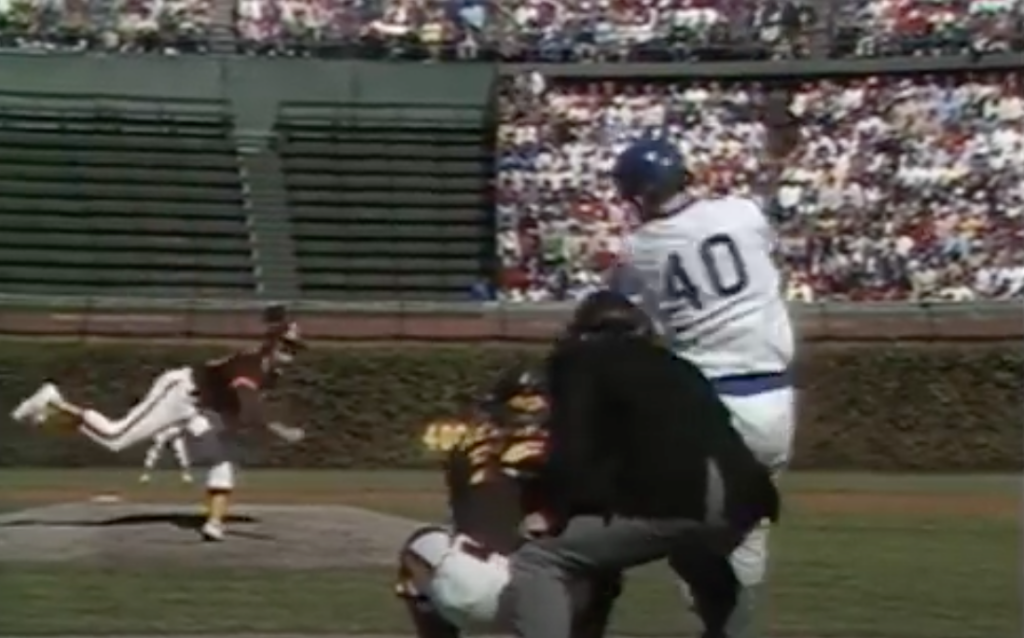
Like a lot of Americans outside Chicago, I’d discovered the Cubs on WGN TV, one of the only nationally available local stations in the early days of cable. To me, the Cubs were a charming alternative to the hometown Indians, who played in a terrible old stadium in a wasteland by Lake Erie that was somehow cold in July. The Cubs, on the other hand, did their losing in a tiny little ballpark that seemed impossibly situated in the middle of a dense brick neighborhood in a fascinating city I’d never seen. I loved everything about the Cubs: Their basic uniforms, that looked as if a second-grader could have designed them. The ivy on their outfield walls. And their underdog status, which as a Cleveland fan, I was comfortable with.
But now they had a chance. They won Game 2, also in Chicago.
And then they went West, needing to win only one out of the next three games in San Diego to get into the World Series!
The Padres crushed the Cubs 7-1 in the first game out there, reducing the Cubs’ series lead to 2-1. I probably didn’t see that one, because it was on after my bedtime and my parents didn’t see a sporting contest as any reason to make an exception. I don’t remember seeing Game 4, either, for the same reason. The Cubs lost that one too, 7-5.
So it came down to Game 5, on October 7, a Sunday afternoon. As the only sports fan in my family, I watched the game, as usual, by myself, upstairs in my parents’ bedroom, where the only color TV in the house, an old RCA, sat on a low bench. I sat on the floor in front of the big set, atop a yellow, long-haired shag rug, staring desperately through an electronic window, from a dark October early evening in Hudson, Ohio, into the sunny mid-afternoon sun in San Diego, California. It was like looking into another dimension and it might as well have been traveling in time …

Orioles manager Earl Weaver and California Angels’ slugger Reggie Jackson flank play-by-play announcer Don Drysdale as guest analysts. Down on the field, former Cardinals’ catcher Tim McCarver is interviewing the impossibly all-American action figure of a baseball player, the San Diego first baseman, Steve Garvey.
The Cubs Little League-looking leadoff hitter Bobby Dernier is up to start the first inning. The personification of an underdog hits a bloop that’s caught by the Padres’ second baseman. Cubs’ superstar second baseman Ryne Sandberg lines out hard to third. Gary Matthews walks, bringing up the Cubs’ cleanup hitter, the bespectacled first baseman Leon “Bull” Durham.
Home run, and the Cubs lead 2-0. I remember none of the joy I must have felt at this moment.
Now Padres’ starting pitcher Eric Show walks Cubs centerfielder Keith Moreland, and looks to be laboring badly and receives a long visit on the mound, by his pitching coach. “I think it’s very important right now for Eric Show to get his confidence back and get his game together,” says Reggie Jackson. “He’s already had one bad ballgame and he does not want to have two. As Earl Weaver said, it’s a long, cold winter, even in San Diego.”
Show gets Cubs’ third baseman Ron Cey to pop out.
Rick Sutcliffe is starting again, and in a pre-game interview looks supremely confident as he says, “If I was a betting man, believe me, I’d be putting the weight on my shoulders today. I like our chances.” Why wouldn’t he look confident? During the regular season after coming to the Cubs, he was 16-1.
I remember one moment in this game so clearly that it blots out all of the rest. So far, it’s like I’m watching this game for the first time. Again. And almost believing that the Cubs will win. Again.
[Of course, I’m looking back at this from after the Cubs have won a World Series, in 2016. When that happened, I stopped taking the losses of the teams I’d followed—the Browns, the Cubs, the Indians, the Cavaliers—as a personal referendum on whether I was, or was not, a loser. But back in 1984, this connection was just forming. My teams’ wins and losses were more or less indistinguishable from my personal triumphs and failures; and so far, the losses and failures seemed more spectacular and defining than the wins and triumphs—and more frequent, too.]
Sutcliffe retires the Padres’ side in order and we go to the second—which Cubs catcher Jody Davis leads off with a home run to left field. Three-nothing, Cubs. I don’t remember this, either. Don’t remember feeling smug, don’t remember feeling nervous. Just remember sitting on that yellow, two-inch shag, against my parents’ bed, the big RCA three feet from my face, back when people worried about TVs giving off “radiation.” Soon enough, this TV would give off worse than that.
Padres do nothing in the bottom of the second, Cubs do nothing in the top of the third, Padres do nothing in the bottom. “The Wave” goes around the ballpark. Cubs go down in order in the fourth, and Padres do too.
Now we’re in the fifth, with the Cubs leading 3-0. [My 15-year-old self must have been feeling pretty good at this point—or did the lad already understand at some emotionally precious level how these things usually worked out for him? “When something goes wrong, I’m the first to admit it …”]
After Sutcliffe retires the first man in the top of the fifth, Jackson says of Sutcliffe, “You can’t let this man get his boat too far offshore, or you just won’t catch him. He’s got everything going for him—confidence, the year he had, today’s ballgame—he doesn’t need too much to get him going, that’s for sure.” Drysdale replies, “Well I’ll tell you how he’s finished up the season. In his last six starts, Sutcliffe allowed four hits in one game, three hits in another game, two hits in his last two starts. Now what’s the matter with that?”
After Bull Durham half-boots a ground ball into right field for a dubious infield hit, Drysdale plugs the upcoming presidential debate later that night on ABC between President Reagan and Democratic Candidate Walter Mondale, moderated by Barbara Walters. The shadows at San Diego’s Jack Murphy stadium are lengthening. But Sutcliffe retires the side again, and we move to the top of the sixth inning.
“And you know, back in Chicagoland, they are starting the countdown right now,” Drysdale says.
Cubs do nothing in the top of the sixth. As the bottom of the sixth opens, Earl Weaver says, “It’s getting late right now. I feel these Padres fans can sense it now, Don.” At that exact moment a San Diego bunt, for a base it. “Perfect bunt,” Jackson says. Yes, but Bull Durham had a chance to field it, and he dropped it. Still—one on, our ace on the mound, and a three-zero lead. But young Tony Gwynn at the plate. God he gets that bat around fast.
[This must have been around dinnertime in Ohio. Somehow I had talked my parents out of bothering me about dinner on this night.]
Gwynn singles to left field, and now the Padres have men on first and second with nobody out, and as the Cubs’ pitching coach Jim Frey visits Sutcliffe, Steve Garvey comes up. The shadow from the back of the stadium has crept up to home plate. After this at-bat, that shadow will make hitting very difficult, for the rest of this game. You didn’t need to be a longtime baseball fan to realize this is one important at-bat.
Sutcliffe throws high, ball one; a cloud of infield dust explodes out of catcher Jody Davis’ glove. High again, 2-0. High again, 3-0. Sutcliffe is chomping on his gum. And he walks Garvey. Bases loaded, nobody out. “And the bell still has not rung in the bullpen,” Drysdale points out ominously.
Fly out to right, the runners tag and it’s 3-1 with one out and runners on first and third. A screaming, low, fading line drive to left, but Gary Matthews makes a mensch’s catch in left. Still, a tagging baserunner scores, and now with two outs, it’s 3-2. A chopper to Bull Durham, who picks it up on a short hop and retires the side. “We’re through six complete. Cubs three, Padres two.”
Now the shadow is well across the plate. Keith Moreland looks befuddled in the box. The Wave rounds the stadium again. Moreland lines out to left. Cey flies out to center. Jody Davis grounds out to short. I mean, can you see the ball?
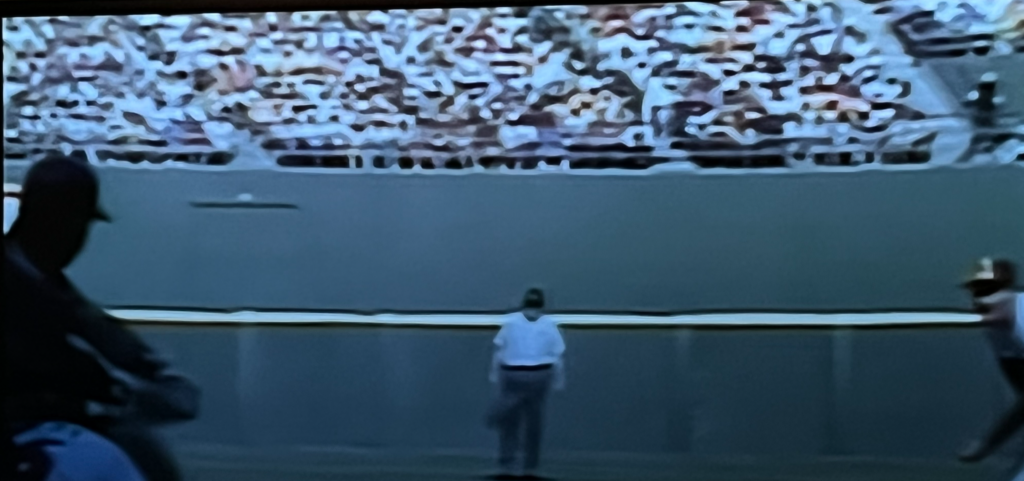
But surely the Padres can’t see it, either. We’re in the bottom of the seventh inning.
Rick Sutcliffe walks the first batter on four straight pitches. The Cubs’ Steve Trout, normally a starting pitcher, is is warming up in the bullpen. A sacrifice bunt moves the runner to second, now with one out.
We are now well over two hours into this game. And still, I remember exactly none of what I have seen, so far.
A pinch-hitter named Tim Flannery comes to bat. “Ground ball, hit to Durham—right through his legs! Here comes Martinez, we’re tied at three!”
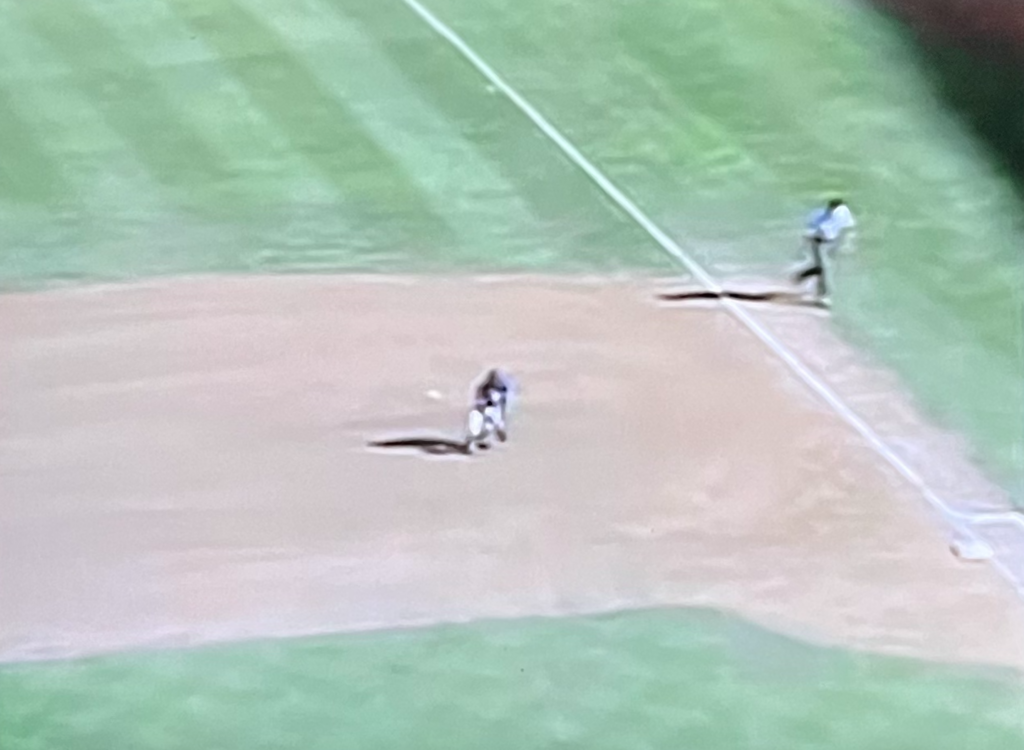
Now I remember as if it is the present: I reach down and dig both hands into that yellow shag carpeting, grabbing a handful in each. And I attempt, with every ounce of the power of whatever anguish a 15-year-old soul can summon, to tear those fistfuls of carpeting out, by the roots. But those strands are made of a polyester-forward chemical blend that does not yield even to extreme expressions of human grief. I pulled, until my fingers almost bled. Until they almost bled. I could have turned over a Volkswagen Beetle at that moment, but I could not pull out any of that carpet.
Oh, and I remember now. And I knew. I knew for sure. The Cubs were going to lose.
A base hit to left, runners on first and second, still with one out. Tony Gwynn comes up. Rips one by Sandberg at second, two runs score. Five-three, Padres. Steve Garvey comes up, hits the first pitch up the middle for a base hit, and the Padres now lead 6-3—as much as the Cubs had led, for most of the game.
Top of the eighth. The Padres’ fearsome closer Goose Gossage is now pitching through the shadow.
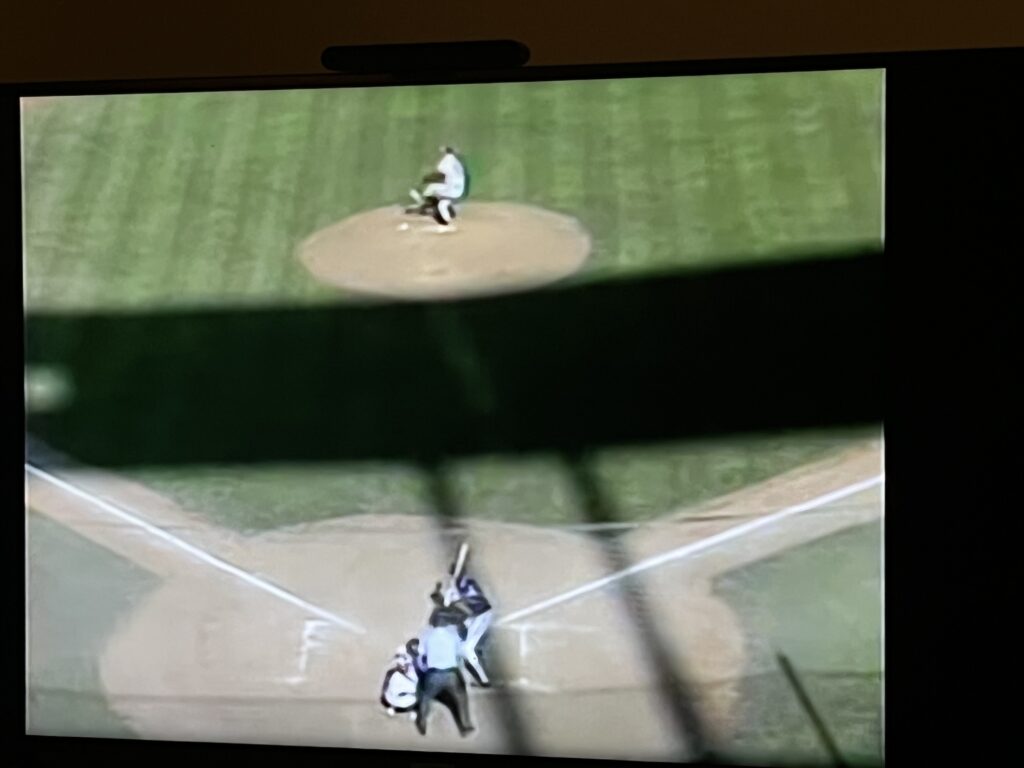
The Cubs get a couple baserunners on with two outs, and Gary Matthews faces Gossage and takes the count to 2-2 before striking out to end the threat.
After the Padres go down in the bottom of the eighth, the Cubs have one more ostensible chance in the top of the ninth. If this had seemed to my 15-year-old self as a real chance, I would remember it. But no, tonight it seems as if I’m watching it for the first time.
Bull Durham leads off, with a gleaming chance at redemption. Against Gossage, a long and quarrelsome at-bat ends with a fly ball to right and a great catch in foul territory by Tony Gwynn. One out. Keith Moreland singles to right. “If you take the Cubs out, you’ve gotta knock ’em out.” Cey is up. Pops out to Garvey at first. “And they’re down to one.” The San Diego crowd has become a relentless metallic drone. A ground ball to third, a force at second and the game is over.
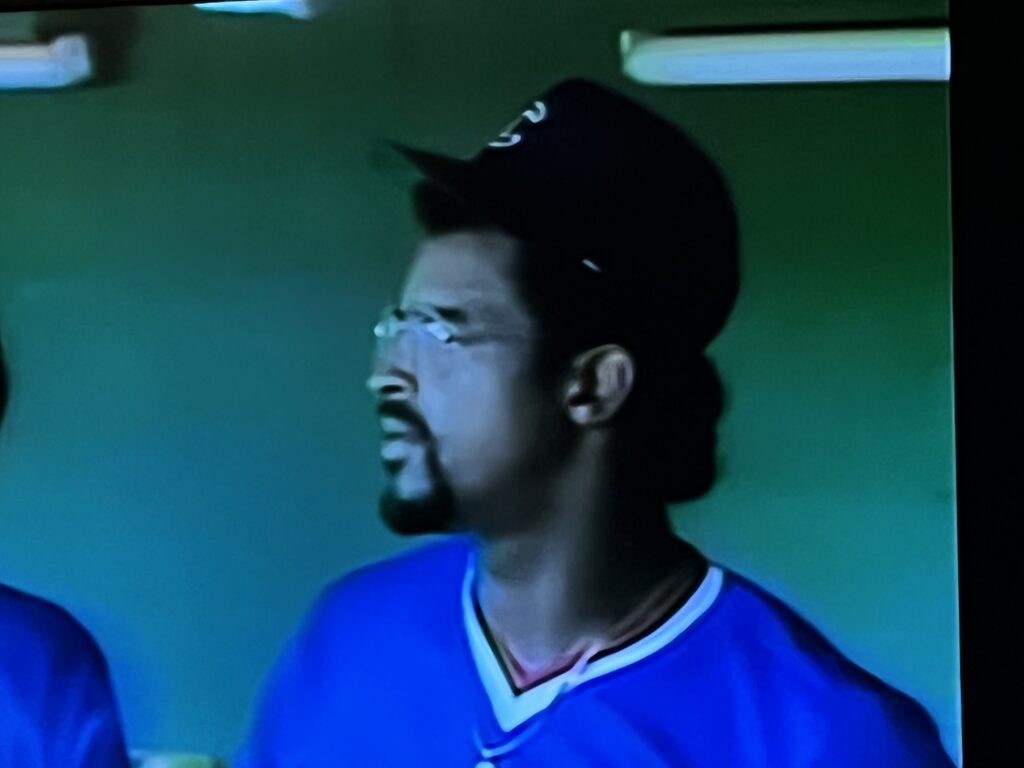
No one in my house cared, and I was beyond questioning—and also long before questioning—why I cared so much.
But if you remember the first times you felt sadness, you understand.
***
Postscript: This week Steve Garvey, now 74, announced he’s running for U.S. Senate, in California. I’m voting for Leon Durham.
Leave a Reply